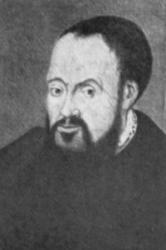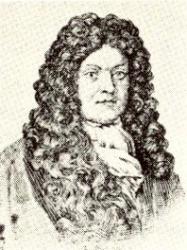
1837 - 1898 Person Name: William C. Dix Hymnal Number: d15 Author of "This, this is Christ the king" in The Chapel Choir Most British hymn writers in the nineteenth century were clergymen, but William C. Dix (b. Bristol, England, 1837; d. Cheddar, Somerset, England, 1898) was a notable exception. Trained in the business world, he became the manager of a marine insurance company in Glasgow, Scotland. Dix published various volumes of his hymns, such as Hymns of Love and Joy (1861) and Altar Songs: Verses on the Holy Eucharist (1867). A number of his texts were first published in Hymns Ancient and Modern (1861).
Bert Polman
========================
Dix, William Chatterton, son of John Dix, surgeon, of Bristol, author of the Life of Chatterton; Local Legends, &c, born at Bristol, June 14, 1837, and educated at the Grammar School of that city. Mr. Chatterton Dix's contributions to modern hymnody are numerous and of value. His fine Epiphany hymn, "As with gladness men of old,” and his plaintive ”Come unto Me, ye weary," are examples of his compositions, many of which rank high amongst modern hymns. In his Hymns of Love and Joy, 1861, Altar Songs, Verses on the Holy Eucharist, 1867; Vision of All Saints, &c, 1871; and Seekers of a City, 1878, some of his compositions were first published. The greater part, however, were contributed to Hymns Ancient & Modern; St. Raphaels Hymnbook, 1861; Lyra Eucharidica, 1863; Lyra Messianica, 1864; Lyra Mystica, 1865; The People's Hymns, 1867; The Hymnary, 1872; Church Hymns, 1871, and others. Many of his contributions are renderings in metrical form of Dr. Littledale's translation from the Greek in his Offices . . . of the Holy Eastern Church, 1863; and of the Rev. J. M. Rodwell's translation of hymns of the Abyssinian Church. These renderings of the "songs of other Churches" have not received the attention they deserve, and the sources from whence they come are practically unknown to most hymnal compilers. Mr. Dix has also written many Christmas and Easter carols, the most widely known of which is "The Manger Throne." In addition to detached pieces in prose and verse for various magazines, he has published two devotional works, Light; and The Risen Life, 1883; and a book of instructions for children entitled The Pattern Life, 1885. The last-named contains original hymns by Mr. Dix not given elsewhere. In addition to the more important of Mr. Dix's hymns which are annotated under their respective first lines, the following are also in common use:-
1. God cometh, let the heart prepare. Advent. In his Vision of All Saints, &c, 1871.
2. Holy, holy, holy, to Thee our vows we pay. Holy Communion. Published in his Altar Songs, 1867, in 6 stanzas of 6 lines, and headed "Eucharistic Processional for Dedication Feast." In the Society for Promoting Christian Knowledge Church Hymns, 1871, and others in an abridged form.
3. How long, O Lord, how long, we ask. Second Advent. Appeared in the Appendix to the Society for Promoting Christian Knowledge Psalms & Hymns, 1869, and repeated in several collections.
4. In our work and in our play. Children's Hymn. Published in his Hymns and Carols for Children, 1869, and is largely adopted in children's hymnbooks, as Mrs. Brock's Children's Hymnbook, 1881, and others. Also in the Society for Promoting Christian Knowledge Church Hymns, 1871.
5. In the hollow of Thine hand. For Fair Weather. Appeared in the People's Hymns, 1867, and repeated in several others.
6. Joy fills our inmost heart today. Christmas. Printed in the Church Times, and then on a Flysheet by Gr. J. Palmer, as the third of Four Joyful Hymns for Christmas, circa 1865. It is in the Society for Promoting Christian Knowledge Church Hymns, 1871, and other hymnals. It is also one of Mr. Dix's Christmas Customs & Christmas Carols, not dated.
7. Lift up your songs, ye thankful. St. Ambrose. Contributed to the People's Hymns, 1867.
8. Now in numbers softly flowing. St. Cecilia. Contributed to the People's Hymns, 1867.
9. Now, our Father, we adore Thee. Praise to the Father. Appeared in the Appendix to the S. P. C. K. Psalms & Hymns, 1869.
10. O Christ, Thou Son of Mary. St. Crispin. First printed in the Union Review, Sept., 1866, and thence into the People's Hymns, 1887.
11. O Cross which only canst allay. Glorying and Trusting in the Cross. Published in the People's Hymns, 1867.
12. O Thou the Eternal Son of God. Good Friday. Appeared in Lyra Messianica, 1864; the author's Hymns and Carols for Children, 1869; the S. P. C. K. Church Hymns, 1871, &c.
13. On the waters dark and drear. For use at Sea. Published in Hymns for Public Worship, &c. (St. Raphael's, Bristol), 1861; the S. P. C. K. Church Hymns, 1871, &c.
14. Only one prayer to-day. Ash Wednesday. Contributed to the People's Hymns, 1867.
15. Sitting at receipt of custom. St. Matthew. Appeared in the People's Hymns, 1867.
16. The Cross is on thy brow. Confirmation. In the 1869 Appendix to the S. P. C. K. Psalms & Hymns.
17. The stars above our head. Work and Humility. In the 1869 Appendix to the S. P. C. K. Psalms & Hymns.
18. When the shades of night are falling. Evening Hymn to the Good Shepherd. In the author's Seekers of a City, &c. [1878].
Most of Mr. Dix's best-known hymns, and also some of those named above, are in common use in America and other English-speaking countries. In Great Britain and America from 30 to 40 are in common use. He died Sept. 9, 1898.
-- John Julian, Dictionary of Hymnology (1907)
======================
Dix, William Chatterton, p. 302, ii. Additional hymns by Mr. Dix now in common use are:—
1. Lift up your songs, ye angel choirs. Ascension.
2. Now, my soul rehearse the story. Christ Feeding the Multitude.
3. Within the temple's hallowed courts. Blessed Virgin Mary. These hymns are from his Altar Songs, 1867.
--John Julian, Dictionary of Hymnology, Appendix, Part II (1907)
W. Chatterton Dix


 My Starred Hymns
My Starred Hymns







